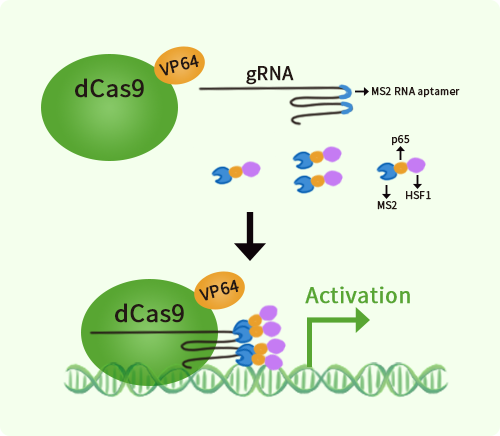Human METTL14 activation kit by CRISPRa
CAT#: GA111713
METTL14 CRISPRa kit - CRISPR gene activation of human methyltransferase like 14
CNY 12,255.00
Specifications
| Product Data | |
| Format | 3 gRNAs (5ug each), 1 scramble ctrl (10ug) and 1 enhancer vector (10ug) |
| Symbol | METTL14 |
| Locus ID | 57721 |
| Kit Components | GA111713G1, METTL14 gRNA vector 1 in pCas-Guide-GFP-CRISPRa GA111713G2, METTL14 gRNA vector 2 in pCas-Guide-GFP-CRISPRa GA111713G3, METTL14 gRNA vector 3 in pCas-Guide-GFP-CRISPRa 1 CRISPRa-Enhancer vector, SKU GE100056 1 CRISPRa scramble vector, SKU GE100077 |
| Disclaimer | These products are manufactured and supplied by OriGene under license from ERS. The kit is designed based on the best knowledge of CRISPRa SAM technology. The efficiency of the activation can be affected by many factors, including nucleosome occupancy status, chromatin structure and the gene expression level of the target, etc. |
| Reference Data | |
| RefSeq | NM_020961 |
| Synonyms | KIAA1627 |
| Summary | The METTL3-METTL14 heterodimer forms a N6-methyltransferase complex that methylates adenosine residues at the N(6) position of some mRNAs and regulates the circadian clock, differentiation of embryonic stem cells and cortical neurogenesis (PubMed:24316715, PubMed:24407421, PubMed:25719671, PubMed:29348140, PubMed:27373337, PubMed:27281194). In the heterodimer formed with METTL3, METTL14 constitutes the RNA-binding scaffold that recognizes the substrate rather than the catalytic core (PubMed:27627798, PubMed:27373337, PubMed:27281194, PubMed:29348140). N6-methyladenosine (m6A), which takes place at the 5'-[AG]GAC-3' consensus sites of some mRNAs, plays a role in mRNA stability and processing (PubMed:24316715, PubMed:24407421, PubMed:25719671). M6A acts as a key regulator of mRNA stability by promoting mRNA destabilization and degradation (By similarity). In embryonic stem cells (ESCs), m6A methylation of mRNAs encoding key naive pluripotency-promoting transcripts results in transcript destabilization (By similarity). M6A regulates spermatogonial differentiation and meiosis and is essential for male fertility and spermatogenesis (By similarity). M6A also regulates cortical neurogenesis: m6A methylation of transcripts related to transcription factors, neural stem cells, the cell cycle and neuronal differentiation during brain development promotes their destabilization and decay, promoting differentiation of radial glial cells (By similarity).[UniProtKB/Swiss-Prot Function] |
Documents
Resources
| 基因表达相关资源 |
Other Versions
| SKU | Description | Size | Price |
|---|---|---|---|
| KN400925 | METTL14 - KN2.0, Human gene knockout kit via CRISPR, non-homology mediated. |
CNY 8,680.00 |
其它METTL14产品


 United States
United States
 Germany
Germany
 Japan
Japan
 United Kingdom
United Kingdom
 China
China

